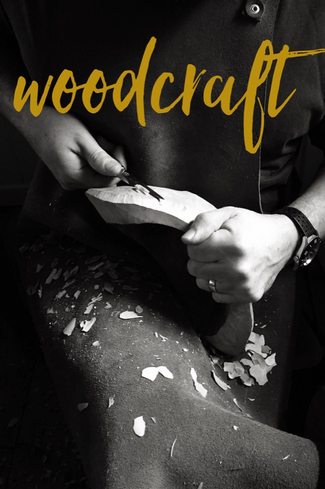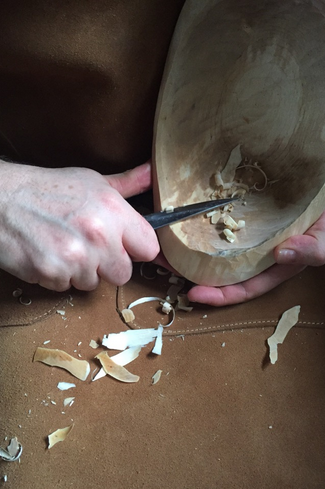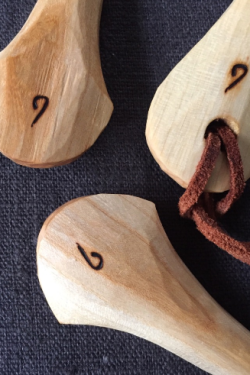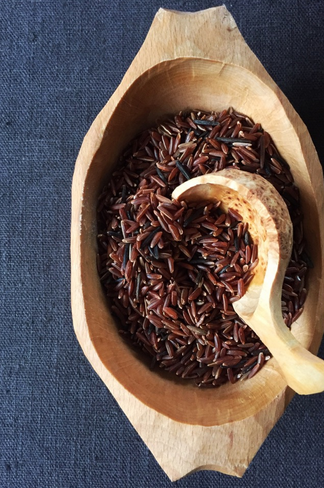| My lovely friend The Lifestyle Editor published a Q&A about me and what I do today .. A leaning towards a slower lifestyle, to offset the fast-paced world we all live in, has seen a rise in more and more of us turning to traditional crafts as a way of relaxation. One of those skills being revived is wood crafting, and the ancient art of spoon-making is enjoying a popular revival - complete with shop-window workshops and weekend-dedicated spoon-making festivals. I recently caught up with Andrew Byham, a financial website consultant by day and wood-obsessed crafter at night, to discuss his new-found passion. Why did you start this new craft-making skill? I started whittling spoons and bowls simply for relaxation - switch off ‘me’ time. I was looking for a creative escape in an increasingly digital world. Where did you learn how to wood craft? I’ve only been carving for about 18 months, but most of my learning has been self taught trial and error…though I’ve had tuition from a wide range of tutors at the school of YouTube! Last year, along with my two sons, I was lucky enough to attend a fantastic gathering of green woodworkers in Derbyshire called Spoonfest. Three inspiring days surrounded by 300+ craftspeople ranging from the novice to the inspiring genius. Workshops run throughout the day, ranging from basic axe skills, through production carving techniques, to the finest finishing. I picked up more skills in those three days than I did the whole time of self tuition. Did you have to purchase a lot of tools to get started? What are your favourites? My first tools came from Robin Wood, who sells a very well priced starter ‘kit’ of axe, straight carving knife and curved spoon knife. Over time I’ve added more tools to do different jobs, perhaps to cut deeper bowls or kuksas (Scandinavian-inspired wooden drinking cups). I have a number of straight knives suited to different stages of carving, but the essentials for carving spoons are all in the Robin Wood set. How long does a spoon and bowl take to make? Depends on the item and how long I want to invest in it. Spoons can take anywhere between 50 minutes and a couple of hours, bowls are more likely to take three to five hours. I’m very new to the craft and still learning so much with each piece I carve, so a significant amount of time is investing in the learning curve. Can you tell us about your carving process? I only work with ‘green’ unseasoned wood, which means I can start to carve as soon as it’s felled. I use a small hatchet to achieve the basic outline, then move on to knives of various shapes and sizes - all razor sharp. Pieces are all finished to about 90% while the wood still contains moisture from the growing tree - it’s far easier to cut when green. Once I’m happy with the overall shape, the pieces are left to dry for a few weeks before finishing with my sharpest of knives. I never sand the pieces - as long as the knives are sharp, the finish they leave is far better than sandpaper. What inspires your designs? Design is often driven by the materials and tools I use. I draw inspiration from a hugely talented community of green woodworkers, but spoons, bowls and kuksas must be primarily functional. You must use a lot of wood, where do you source it from? I’m involved in local conservation and land management projects which give me access to the perfect materials - typically Birch and Beech green woods. I take wood that’s destined for the bonfire and turn it into something useful. What advice would you give to anyone wanting to learn? If you’re thinking of taking this up as a hobby, you must first be aware you’ll become hopelessly addicted to it! Whilst I picked up a lot of tips online, I would urge anyone to go one of the many short courses around the country. Courses are run by some of the best wood carvers…my initial inspiration was from Robin Wood; my sons were lucky enough to join the axe workshop with Barn Carder at Spoonfest. Barn has a shop window workshop in Hackney and is involved withThe Green Wood Guild in London. You could treat yourself to a truly immersive off-grid experience with Hatchet & Bear but don’t for one minute think it’s anything like the Plusnet advert! Most importantly, do it because you enjoy it - you’ll get better without even noticing. You can read the full Q&A here |





 RSS Feed
RSS Feed



